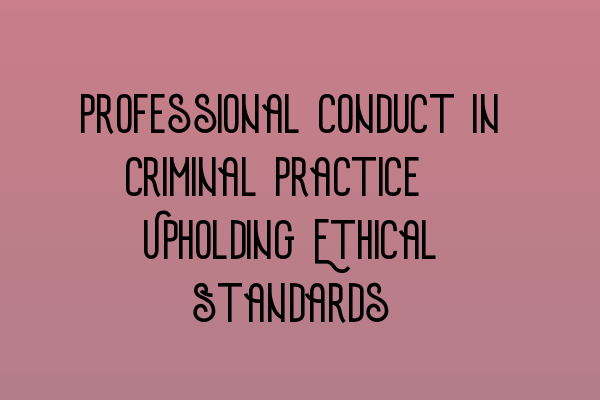Professional Conduct in Criminal Practice: Upholding Ethical Standards
Welcome to SQE Criminal Law & Practice Law UK! As solicitors and legal professionals, it is our responsibility to uphold high ethical standards in our criminal practice. Upholding professional conduct is not only essential for maintaining our reputation but also for ensuring fair and just outcomes for our clients.
Key Ethical Principles
When it comes to professional conduct in criminal practice, there are several key ethical principles that we must adhere to:
- Integrity: We must act honestly and with integrity at all times. This includes being truthful with our clients, the court, and other parties involved in the legal process.
- Confidentiality: We have a duty to protect our clients’ confidentiality. It is essential to maintain the utmost confidentiality when handling sensitive information related to our clients’ cases.
- Conflict of Interest: We must avoid any conflicts of interest that may compromise our ability to provide unbiased and diligent representation to our clients. It is important to disclose any potential conflicts to our clients and seek their informed consent.
- Competence: We must continually strive to maintain and enhance our professional knowledge and skills to ensure competent representation for our clients. This includes staying updated with the latest developments in criminal law and practice.
- Professionalism: We must conduct ourselves in a professional manner at all times, treating everyone with respect and courtesy. This extends to our interactions with clients, colleagues, and the court.
Adhering to Ethical Standards
As legal professionals, it is crucial to stay informed about the current code of conduct and ethical guidelines set by the Solicitors Regulation Authority (SRA). Familiarize yourself with the SRA Handbook, as it provides essential guidance on professional conduct in criminal practice.
In addition to the SRA guidelines, it is beneficial to participate in ongoing professional development courses to enhance your knowledge and skills. SQE Criminal Law & Practice Law UK offers SQE 1 and SQE 2 preparation courses, which can help you stay up to date with legal developments and enhance your competence.
Continuous professional development not only demonstrates your commitment to maintaining high ethical standards but also ensures you are providing the best possible representation to your clients.
The Consequences of Ethical Violations
Failure to maintain ethical standards can have severe consequences for legal professionals. Ethical violations can result in disciplinary action by the SRA, including fines, restrictions, or even removal from the solicitors’ register.
Moreover, ethical misconduct can severely damage your reputation and credibility as a criminal law practitioner. It can also negatively impact your relationships with clients, colleagues, and the court.
Conclusion
Upholding professional conduct and ethical standards is crucial for criminal law practitioners. By adhering to key ethical principles, staying informed about regulatory guidelines, and actively engaging in continuous professional development, we can ensure fair and just outcomes for our clients while maintaining the integrity of the legal profession.
For more information on SQE 1 and SQE 2 preparation courses, visit our related articles:
- SQE 1 Practice Exam Questions
- SQE 1 Practice Mocks FLK1 FLK2
- SQE 2 Preparation Courses
- SQE 1 Preparation Courses
- SRA SQE Exam Dates
